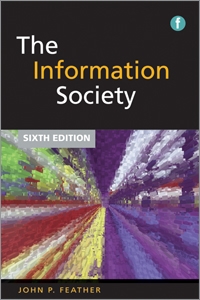
Primary tabs
You don't need to be an ALA Member to purchase from the ALA Store, but you'll be asked to create an online account/profile during checkout to proceed. This Web Account is for both Members and non-Members. Note that your ALA Member discount will be applied at the final step of the checkout process.
If you are Tax-Exempt, please verify that your account is currently set up as exempt before placing your order, as our new fulfillment center will need current documentation. Learn how to verify here.
- Description
- Table of Contents
- About the author
- Reviews
What is information? Who are the information rich and who are the information poor? How can there be equality of access for users in the light of the political, economic and cultural pressures that are placed upon information creators, gatherers and keepers? Set against a broad historical backdrop, The Information Society explores the information revolution that continues to gather pace, as the understanding and management of information becomes even more important in a world where data can be transmitted in a split second.
This latest edition of this standard work has been fully updated to take account of the changing landscape and technological developments since 2008. The social Web, or Web 2.0, is now embedded in daily life, and some of its applications have become the most popular forms of communication system. Even the predominance of email – one of the most familiar manifestations of the information revolution – is now threatened by texting and the use of such applications as Twitter. The ways in which we expect to interact with information – and how much we are willing to pay for access to it – are throwing up new opportunities and debates.
At a societal level, as the quantity of personal digitized information continues to grow exponentially, so do both the benefits of exploiting it and the dangers of misusing it. The use of ICT to make government more accessible has to be balanced against the use of technologies that enable the state to be more vigilant or more intrusive, according to one's point of view.
Behind all of this lies further technical change: the massive expansion of connectivity to high-speed broadband networks; the phased abandonment of analogue broadcasting; and above all the widespread availability and use of sophisticated multi-functional mobile devices which carry voice, video and data and which can themselves be carried anywhere. The implications for daily life, for education, for work and for social and political relationships are massive.
The book is organized into four parts:
- "The Historical Dimension" details society's transition from script to print, and the rise of mass media and new technologies from radio and television to computers;
- "The Economic Dimension" looks at the information marketplace, ranging from traditional publishing to the evolution of the e-book, and the factors that determine access to information;
- "The Political Dimension" discusses why some societies are information rich while others are information poor, and examines the role of the state in the protection of intellectual property, personal data, freedom of information, and censorship;
- "The Information Professional" shows the part that librarians, archivists, records managers, and other information professionals play in the information society, and demonstrates that long-held archetypes are already transitioning into new responsibilities.
Read the Table of Contents and Chapter 1 of this book now!
John Feather
John Feather is Professor of Library and Information Studies and Dean of the Graduate School at Loughborough University, UK. He is a former Pro-Vice Chancellor of Loughborough University.
"What I most enjoy about this book it that it makes me question myself as a library manager and the role that I play within the information society. John Feather encourages every reader to look at libraries as part of the commercialised chain of information supply 258 Reviews and to see potential opportunities for involvement, such as partnerships with publishers and other information providers. For me the book has provoked thought rather than simply conveyed facts, and it has raised just as many questions as it has answered."
— Australian Library Journal


